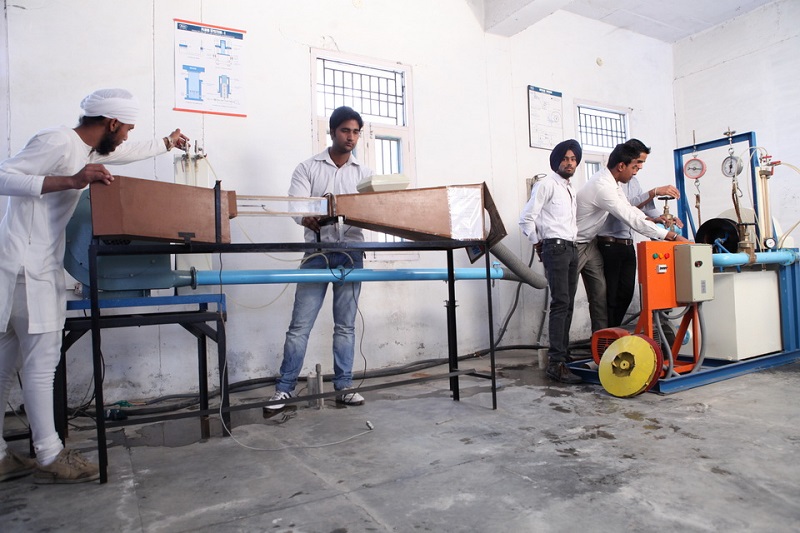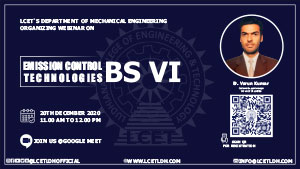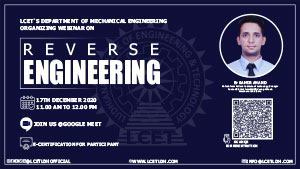Mechanical Engineering
- Home
- Departments
- Engineering
- Mechanical Engineering




Overview
Mechanical Engineering involves the design, analysis, and manufacture of a wide variety of mechanical components and systems. While there are a number of disciplines within mechanical engineering, some of the major areas are energy conversion, materials engineering, design engineering, and manufacturing engineering.
Eligibility
For Regular Course : Qualifying 10+2 or equivalent examination securing passing marks with Physics, Chemistry, and Maths from a recognized University or Board.
For Lateral Entry : Passed 3 year Diploma from recognized University or Board
Programme Details
"The program is divided into eight semesters. The first year, i.e., semester 1 & 2 of the program offers subjects which are compulsory to all students (Physics, Chemistry, Math’s, Engineering Graphics and Design, English, Basic Electrical Engineering, Programming of Problem solving,) along with workshop practices. Students in the second year i.e., semester 3 & 4 introductory subject’s such as: Fluid Mechanics and Machines, Theory of machines, Machine Drawing, Basic Electronics Engineering, Strength of materials, Basic and Applied Thermodynamics, Material Engineering, Environmental science. In The Third year, i.e., semester 5 & 6 specialized subjects like Mathematics-III, Design of Machine Elements, Computer aided design and manufacturing, Mechanical Measurement and metrology, Industrial Automation and Robotics, Automobile Engineering, Heat Transfer, Fluid Machinery, Statistical & Numerical Method in Engineering, Non Conventional energy resources, Minor project. In The Fourth and last year, i.e., semester 7 & 8, particularity in 7th Semester some specialized subjects like Industrial Engineering, Refrigeration & Air conditioning, Mechanical Vibrations, Non Traditional Machining, Human Resources Management, Major Project . In 8th semester students conduct the six month (industrial +Software training) program in field.
Future scope
Mechanical engineers have to deal with concepts such as mechanics, thermodynamics, robotics, kinematics, structural analysis, fluid mechanics and many others. These concepts are applied in the process of designing state-of-the-art manufacturing units, different types of motor vehicles, aircraft and aerospace parts and a vast assortment of industrial machinery. Mechanical engineers also contribute in the development of various engines, power plant equipment, heating and cooling systems and other simple and complex machinery. Mechanical engineers not only design new mechanical systems but they are also responsible for testing, maintaining and manufacturing them
Latest Events & News

14th Annual Athletic Meet
Ludhiana College of Engineering & technology organizing the 14th annual athletic meet on 25th February.

Maha Shivratri
Ludhiana College of Engineering & Technology celebrates Maha Shivratri on 11th March.

Campus Drive
LCET'S Dept. of Training And Placement Cell Organizing Campus Drive on 23rd & 24th March 2021 10AM to 3PM.

International Women's Day
Ludhiana College of Engineering & Technology celebrates International Women's Day on 8th March.

Ghana independence Day
Ludhiana College of Engineering & Technology celebrates the indolence Day of Ghana on 6th March.

National Safety day
Ludhiana College of Engineering & Technology celebrates National Safety Day on 4th March.

World Wildlife day
Ludhiana College of Engineering & Technology celebrates World Wildlife Day on 3rd March.

Christmas Celebrations
Christmas Celebrations at Ludhiana College of Engineering and Technology India

Tech. Talk with Er. Varun
Attend the "Technical Talk with Er. Varun" from Tata Motors Limited on BS 6 Technologies. E-certificates to participants will be awarded Click here to Register

Reverse Engineering
LCET is organising a webinar on Reverse Engineering. Interested candidates can click here to participate and earn the e-certificates.
International Yoga Day
The word ‘yoga’ derives from Sanskrit and means to join or to unite, symbolizing the union of body and consciousness

World blood Donor day
The event serves to raise awareness of the need for safe blood and blood products, and to thank blood donors for their voluntary, life-saving gifts of blood.

Stop Child Labor
This is a international day to raise awareness and prompt action to stop child labor in all of its forms.

World Ocean Day
The World Oceans Day Youth Advisory Council is key to engaging and guiding youth around the world.

Environment Day
The United Nations' principal vehicle for encouraging awareness and action for the protection of our environment.

Internet of Things Short Term Course
Ludhiana college of engineering and technology in collaboration with national...

Gambia Republic Day
Today Mark’s the 54th Independent anniversary of The republic of The Gambia...

Annual Sports Meet
International Soccer Tournament and Annual Athletic Meet 2020...

Liberia Independence Day
Ludhiana College of Engineering & Technology celebrates Liberia Independence Day on 26th July.

Football tournament
A friendly Football tournament organised at LCET among the international students.

World Teachers Day
Ludhiana College of Engineering & Technology celebrates World Teachers Day.

Cancer Prevention
LCET'S Department of Medical Lab Sciences is Going to Organize a Webinar On Cancer Prevention and Healthy Lifestyle

